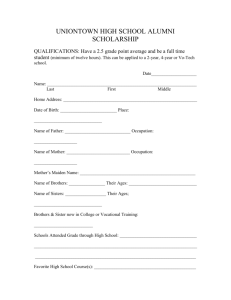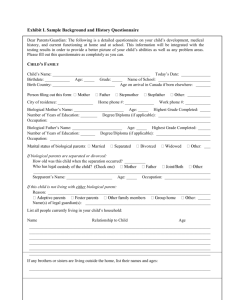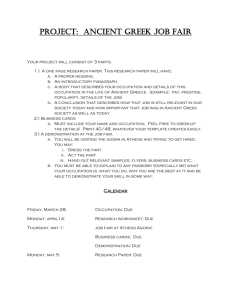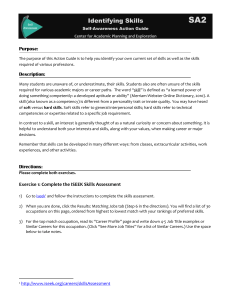Medical Radiological Technology
advertisement
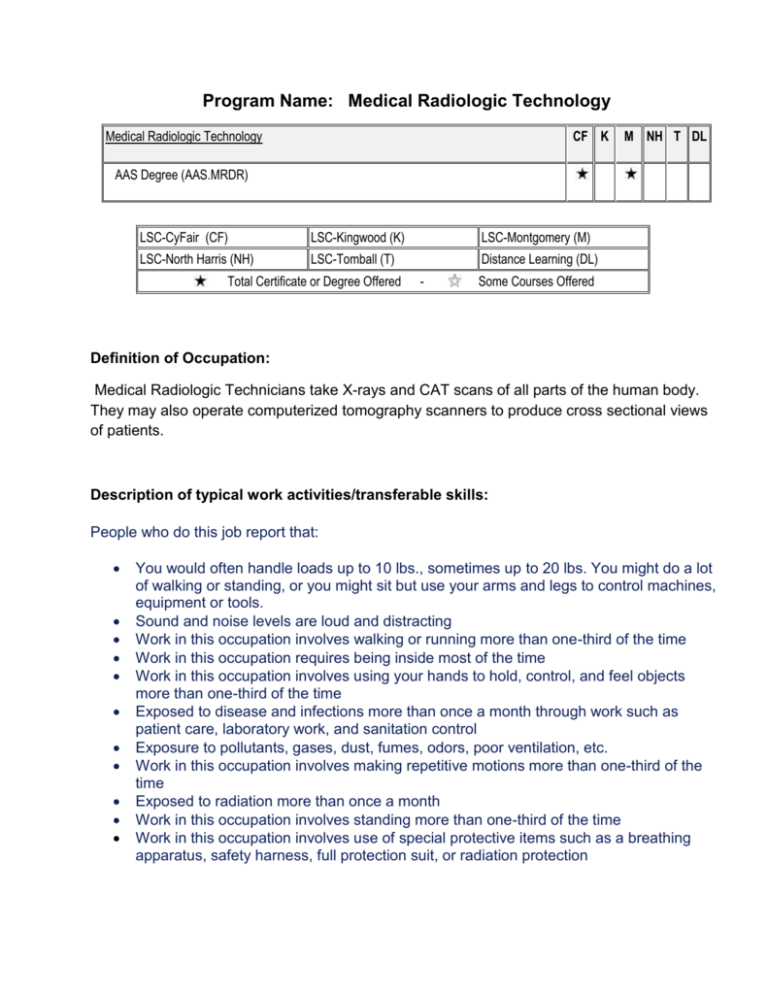
Program Name: Medical Radiologic Technology Medical Radiologic Technology CF K M NH T DL AAS Degree (AAS.MRDR) LSC-CyFair (CF) LSC-Kingwood (K) LSC-Montgomery (M) LSC-North Harris (NH) LSC-Tomball (T) Distance Learning (DL) Total Certificate or Degree Offered - Some Courses Offered Definition of Occupation: Medical Radiologic Technicians take X-rays and CAT scans of all parts of the human body. They may also operate computerized tomography scanners to produce cross sectional views of patients. Description of typical work activities/transferable skills: People who do this job report that: You would often handle loads up to 10 lbs., sometimes up to 20 lbs. You might do a lot of walking or standing, or you might sit but use your arms and legs to control machines, equipment or tools. Sound and noise levels are loud and distracting Work in this occupation involves walking or running more than one-third of the time Work in this occupation requires being inside most of the time Work in this occupation involves using your hands to hold, control, and feel objects more than one-third of the time Exposed to disease and infections more than once a month through work such as patient care, laboratory work, and sanitation control Exposure to pollutants, gases, dust, fumes, odors, poor ventilation, etc. Work in this occupation involves making repetitive motions more than one-third of the time Exposed to radiation more than once a month Work in this occupation involves standing more than one-third of the time Work in this occupation involves use of special protective items such as a breathing apparatus, safety harness, full protection suit, or radiation protection Working in this career involves (physical activities): Seeing clearly up close Speaking clearly enough to be able to be understood by others Judging how far away an object is, or which of several objects is closer or farther away Seeing clearly at a distance Identifying color and seeing differences in color, including shades and brightness Identifying and understanding the speech of another person Work Hours and Travel Irregular hours Weekend work Levels of Education: Certificate: None Associate: AAS Degree (AAS.MRDR) PLEASE NOTE: Transferability of degree or certificate to other institutions will vary depending on the institution and the department. Speak to a counselor or advisor for options. Special Admissions/Prerequisite Courses: Admission to the Medical Radiologic Technology program does have specific admission requirements. Please see the LSCS catalog or website for specific admission requirements. Method of Delivery: Traditional/On-Campus Distance Learning Distance Learning and Traditional Fast - Track Some typical job titles for Medical Radiologic Technician: Ultrasound Technologist – Produces two-dimensional ultrasonic recordings of internal organs, using ultrasound equipment, for use by physician in diagnosis of disease and study of malfunction of organs. Special Procedures Technologist, Magnetic Resonance Imaging – Operates magnetic resonance imaging equipment to produce crosssectional images (photographs) of patient's body for diagnostic purposes. Special Procedures Technologist, Angiogram – Operates diagnostic imaging equipment to produce contrast enhanced radiographs of blood vessels to aid physician in diagnosis and treatment of disease. Special Procedures Technologist, CT Scan – Operates computed tomography (CT) scanner to produce cross-sectional radiographs of patient's body for diagnostic purposes. Types of employers that typically hire graduates: Large concentrations of this occupation are found in these industries: Outpatient, laboratory, and other ambulatory care services (NAICS621400, 500, 9) (11.2%) Offices of physicians (NAICS621100) (20.9%) Hospitals, private (NAICS622000) (60.7%) Medical and diagnostic laboratories (NAICS621500) (8.7%) Workplace Skills: Collecting and recording medical information Entering information on computer terminals Helping people understand health care instructions Operating medical diagnostic equipment Working as a member of a health services team The following information is provided for individuals seeking career counseling. The MBTI provides information regarding an individual’s personality preferences and the Holland code provides information regarding an individual’s interest. If you are interested in learning more about how your interests and personality fit in with this and other career options, please see a career counselor at any of the NHMCCD campuses Myers-Briggs Type (MBTI): INFJ ENTP INFP ENTJ Holland Interest Code: Investigative Social Realistic Working Condition Requirements: People who do this job report that: You would often handle loads up to 10 lbs., sometimes up to 20 lbs. You might do a lot of walking or standing, or you might sit but use your arms and legs to control machines, equipment or tools. Sound and noise levels are loud and distracting Work in this occupation involves walking or running more than one-third of the time Work in this occupation requires being inside most of the time Work in this occupation involves using your hands to hold, control, and feel objects more than one-third of the time Exposed to disease and infections more than once a month through work such as patient care, laboratory work, and sanitation control Exposure to pollutants, gases, dust, fumes, odors, poor ventilation, etc. Work in this occupation involves making repetitive motions more than one-third of the time Exposed to radiation more than once a month Work in this occupation involves standing more than one-third of the time Work in this occupation involves use of special protective items such as a breathing apparatus, safety harness, full protection suit, or radiation protection Industry Certification/Licenses: The American Registry of Radiologic Technologists (ARRT) offers voluntary certification for radiologic technologists. In addition, 35 States use ARRT-administered exams for State licensing purposes. To be eligible for certification, technologists generally must graduate from an accredited program and pass an examination. Many employers prefer to hire certified radiographers. To be recertified, radiographers must complete 24 hours of continuing education every 2 years. Voluntary certification is available from the American Registry of Radiologic Technologists (ARRT) and the Medical Dosimetrist Certification Board (MDCB). For additional information, visit these websites: www.arrt.org Earnings: The 2007 National annual average earnings for this occupation was $51,150. The Texas annual average earnings were $48,350. Source: Choices; access.bridges.com, 2008-09 editions PLEASE NOTE: Earnings and salaries will vary with industry, region and experience of employee. Employment Outlook: The employment change from 2006 to 2016 is estimated to be +15.1%. As the population grows and ages, there will be an increasing demand for diagnostic imaging. Source: Choices; access.bridges.com, 2008-09 editions

